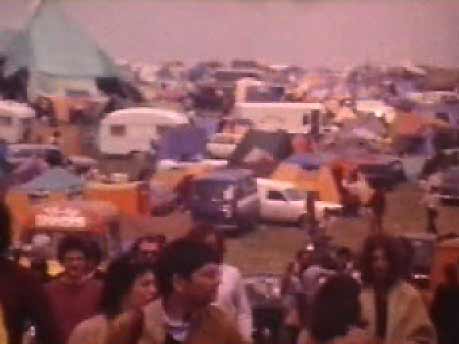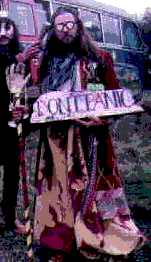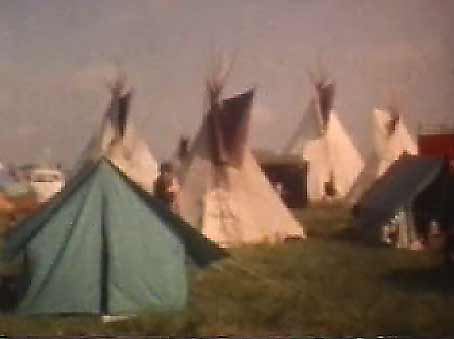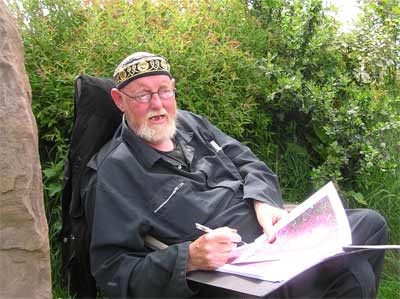The Archive
Formatted for Netscape Navigator at 800 X 600- created Jan 2002.
|
Stonehenge Festival 1982 -press articles. |
|
Sing and Shout For Joy !
By Jeremy Sandford . This
might well be the first year that you can spend the whole summer at
one festival or another. Previously festival addicts who didn't want
to go home had to hole up for odd weeks here and there in corners of
the countryside, but now at last they stretch right through; three packed
months of Pop Festivals, Free Festivals, and Fayre's. |
Photo© Jambo |
Sid Rawles |
Others
who follow through the festival season have saved up through the winter
in order to have an open and and convivial summer, or earn their keep
from organisers by cleaning up the vast pile,of plastic rubbish that a
modern festival leaves behind it. Corrina, singer with the all woman rock
band Androids of Mu who were playing at Stonehenge, told me " The
real importance of the festival, scene is that it provides for city people
an introduction to earth living- it's a breath of freedom." ' 'it 's not too late to have a happy childhood," said a huge notice beside the muddy access route. For those like myself who have always felt a tinge of envy for the Duke in ‘As You Like It’ setting up his court in the Forest of Arden there is an unending fascination in these instant tent cities, rising up overnight in the midst of the countryside. I like to fancy that we can see the everyday world created here in a better land, dedicated to good health,peace, cooperation,- conviviality, and music. |
One evening at Glastonbury
l noted that I could at the same time be studying Indian dances or African
drumming , Tai Chi, face painting, cooperative games, jigging, busking, visiting
a tepee or alternative theatre or film in the tented Pilton Palals, playing
football, frisbee, or bouncing on giant inflatables, 'munching food from the
cuisine of much of the world, buying leather hats jewellery or otherwise renewing
my wardrobe , socialising or listening to the vastly amplified and stunning
Chieftains.
Existing society quickly
recreates itself, with some making huge profits by selling commodities at
an inflated price, while others provide services free, and yet others cast
themselves as rubbish collectors. Musicians, jesters, organisers, or consumers.
And inevitably, sometimes, there are those who push the thing too far, like
the Hell's Angels zooming in for their Saturday night punch up, the indiscreet
and flagrant dealers.
On the wet weekend of midsummer there
were 20,000 people at Stonehenge and another 25 000 at Glastonbury. Where
did it start, this interesting postwar phenomenon ? I think it was Edward
Montague who began in 1958 a two day event at Beaulieu. Four thousand people
came, many of whom camped in special tents provided, and there was a fabulous
amplification , system installed by the Antone firm. Since then, the number
of festivals each year has been growing till now there are something like
forty or fifty.
About the time that Montague ceased his festivals, Harold Pendleton of the
Marquee Club in Soho carried on. His annual festival, held for most of its
history at Reading, has been running for 21 years. FestIvals took a more spiritual
turn with a group of people centering round Michael Eavis, described by a
friend as " a Somerset farmer with crowd gathering tendencies."
Asked by enthusiasts whether his land could used for festivals, Eavis again
and again said yes when most people in his position would say no. The now
legendary 1971 Glastonbury festival was held at his Worthy Farm, as have many
since. culminating in the one this year which attracted 25,000 and showed
a profit not far short of £50,000 which is to be passed on to CND.
| The Fayre's,which tend to be medieval in style and often use acoustic and more folky music, have been developed over the last decade. So have the free festivals, for which there is no entrance fee and which are usually not legal in that they take place on common land where they infringe some by-law or other, or on some " holy " and for which permission was not forthcoming. Sid Rawle who lives in the winter with a hundred or so other people in the tipi village at Tally in South West Wales, has played an important part in the development of these. The fact that the thousands who gather suffer relatively little harassment must to quite a large degree be due to his skilful diplomacy. This year officialdom actually cut the wire round Stonehenge on solstice day so that a procession of hundreds of people could cross the road and enter the shrine, where three weddings and several " namings of babies took place. People related to the divinity which many still feel resides in that place in various ways that they felt appropriate. |
Sid Rawle 2006 © Andy Roberts |
There was a daily rubbish Collection by the local authority, the toilets were kept clean round the clock, running WAter was provided, and medical services were in the hands of the St John Ambulance Brigade. Such public servicing costs a lot less than that for a Royal Garden Party or an agricultural show, but is none the less not bad for something that is ultimately illegal, and is perhaps a good demonstration of our old friend ,the British genius for compromise.
Michael
Clarke , who teaches Sociology at the University of Birmingham, recently published
' The Politics of Pop Festivals' (Junction Books). "
How is it," he asks, " that a somewhat
motley collection of young and not so young people managed to impose their
taste for festivals on the English countryside in summer, in spite of the
rooted opposition of many of the residents '' Part of the answer, he
believes, " is the assumption in the British legal
system to a right of assembly without prior State permission"
It is precisely this element of permission which was sought in Clause S5 of
the County of Lancashire Bill, now going through Parliament, which would have
demanded from organisers up to £1,500 deposit and imposed requirements
on sanitation, water supply, and " public order " (ie, extra police.)
Second thoughts have prevailed, however, and this clause has just been dropped.
 |
The
over-reaction of the police at the Windsor Free Festival In 1974 probably
had an important effect on the way later festivals were treated. A Release
eyewitness describes how " I saw several
people Iying down. suddenly shocked by the arrival of the police who
proceeded to charge straight over them. The front line of police (at
least six) had truncheons drawn and were swinging them viciously at
anyone who got in their way. Plainclothes policemen in the crowd,,previously
planted there, I. presume, and identifiable by their chequered. armbands,
were deliberately pushing people into the uniformed police, provoking
assault by the uniformed police on the individual victims."
The public outcry which followed this treatment of a hitherto peaceful
festival seems to have resulted in police thinking twice before using
such tactics again. The last word should go to Sid Rawle who four years ago penned the following masterful letter to The Times: |
" What has happened at Stonehenge over the last five years is that for the week of midsummer thousands of pilgrims from many religious persuasions have come here The evidence is indisputable that Stonehenge and the surrounding area is one of the most powerful spiritual centres in Europe. It is right that we should meekly stand in the presence of God. but it is proper that we should sing and dance and shout for joy for the love and mercy that He shows us.... We should not put a road through Stonehenge and given our way it would soon be removed. We know that we will soon he called upon to see this nation through some dreadful and difficult times and when that happens you will not find us lacking and we ask now that ourselves and our children be Ieft together in peace to find the necessary strength."
Any info to add -? Get in touch -Contact email




